The enduring appeal of a classic car lies not only in the quality of its craftsmanship, masterful engineering and timeless design but also in the sense of nostalgia that it evokes allowing classic car enthusiasts to capture and relive memories of a bygone time.
Relatively simple to maintain and known to hold their value, these finely-tuned instruments also deliver a rare driving experience that is arguably more visceral and engaging than that offered by more modern cars.
When it comes to buying a classic car, whether as a one-off purchase or to add to a burgeoning collection, it’s important to treat the process as you would with any other investment. Here’s an outline of some practical tips to bear in mind when on the hunt for a classic car.
Do Your Research
Before you make your first bid, it’s important to research the specific make and model of the car you are looking to buy. Begin by finding out about its technical specifications and in particular, any flaws or mechanical issues it is known to have. Resources such as online classic car communities can offer helpful insights as many classic car collectors share their own experiences and advice.
It’s also important to research other matters such as special editions, iconic features, and awards and accolades the car may have garnered as these can all help you to assess the value of the car, ensuring you do not overpay.
Owning a classic car also means being prepared for potentially higher maintenance costs compared to modern vehicles. Classic cars often require specialized care, parts that are harder to find, and expertise that is more specific. Establishing a relationship with a reliable mechanic who has experience with classic vehicles is crucial. Additionally, factor in the logistics and car shipping quotes if you are purchasing from a distance. Using a reliable auto transport service ensures your classic treasure arrives safely at its destination, factoring in both the financial and practical aspects of transporting such a valuable asset. This preparation enables you to enjoy the unique experience of classic car ownership with fewer surprises down the road.
Professional Inspection
It’s important to arrange a professional inspection of the car by an experienced mechanic or classic car expert before driving it away. As well as evaluating the condition of the car to ensure it has been maintained to its original design and specifications, an inspection will also assess its mechanical and structural condition. This can help to identify signs of wear and tear and uncover any potential problems or issues that could cost you down the line. A thorough inspection of the car can also provide you with the necessary details needed to obtain quotes and arrange auto insurance for the vehicle.
Find the Right Mechanic
Unlike a more modern car, a classic car will require specialist attention. Before you make your purchase it’s essential to find someone in your area who is qualified to service and repair classic cars. A good starting place is to enquire at your local garage or post your question on an online classic car forum.
Due to their specialist experience, in many cases, classic car mechanics will charge higher rates and as they are rarer and hard to find, the cost of sourcing replacement parts may also be higher compared to more modern cars. It is important to factor this into your overall costs when considering the ongoing maintenance of your classic car.
Take It for a Test Drive
As with any other car purchase, don’t buy before you try. Taking the car for a test drive will allow you to assess its performance and see how well it handles, accelerates, brakes, and maneuvers. It will also alert you to any unusual sounds, rattling and reverberation that could indicate the need for repairs.
By following these tips you can proceed confidently, knowing you have the information and expertise you need to make the right decision.



